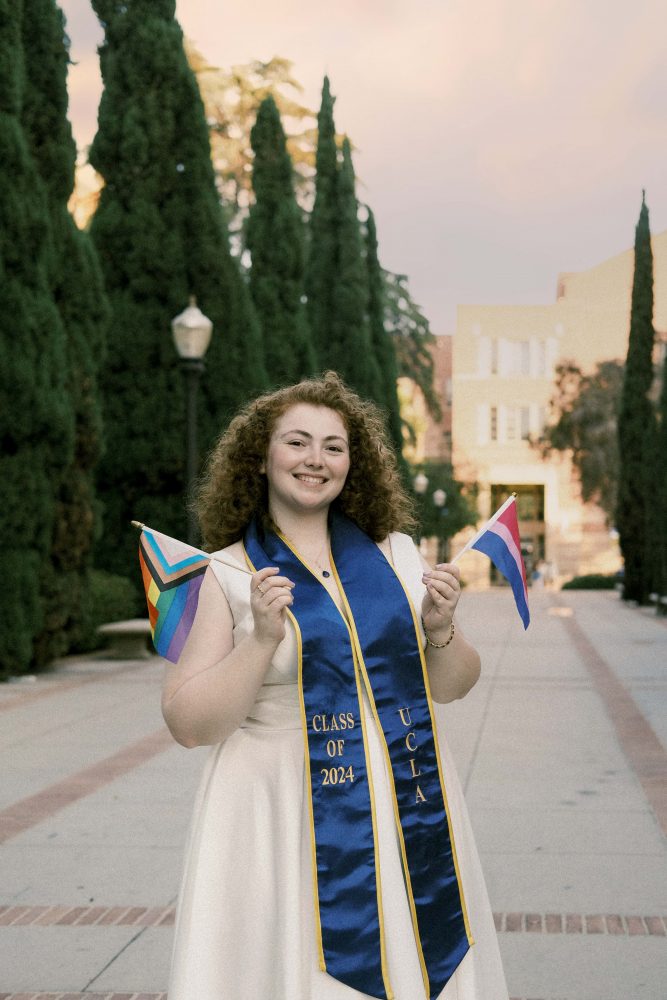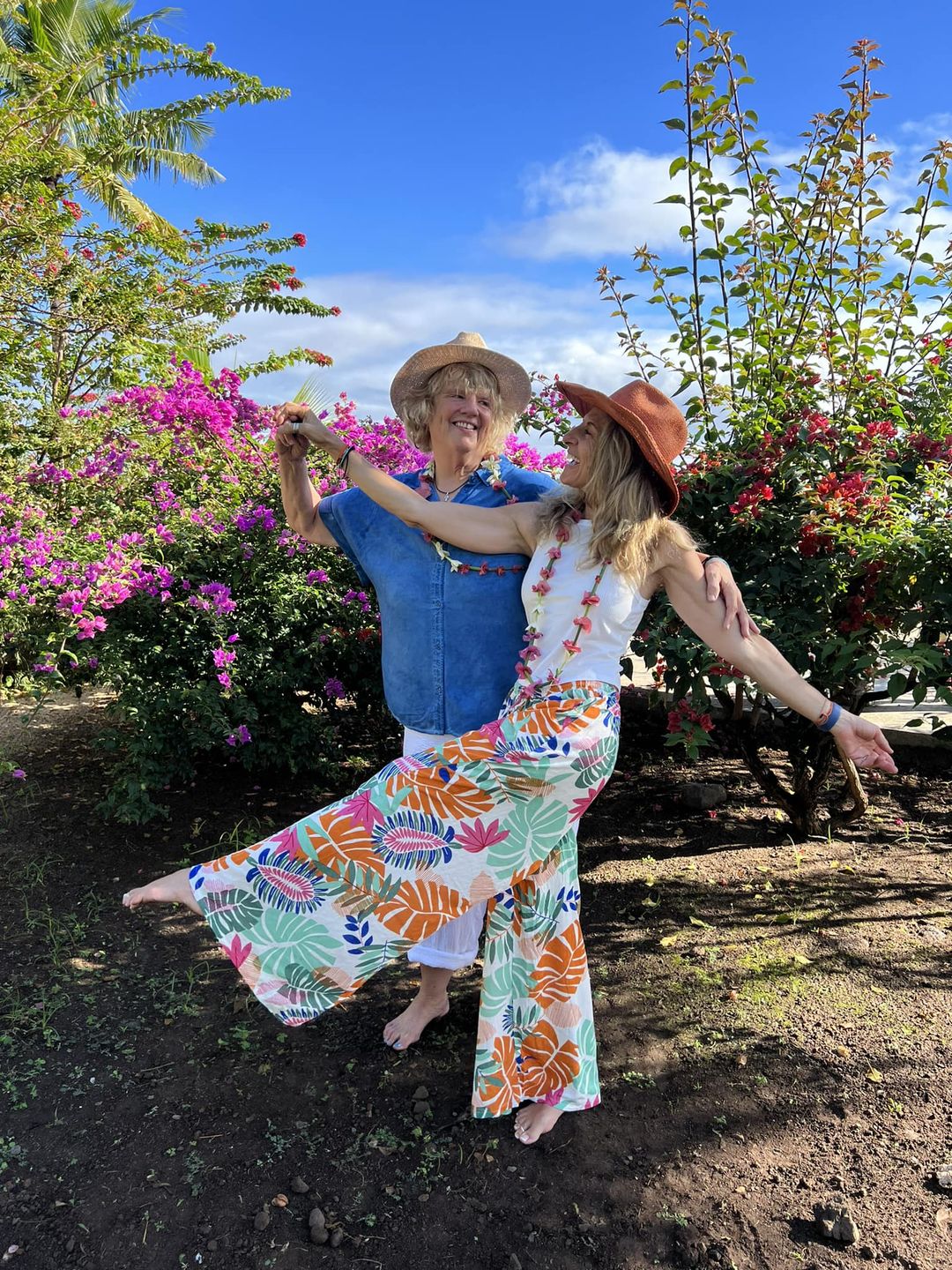Sarah Belew/OutWrite
Content warning: homophobia, mentions of conversion therapy
It was a sunny day in second grade when I stood on the playground’s tallest slide, looked across the field, and chose three girls I would marry — if they were boys, of course. I thought the crushes my fellow classmates had were strange. To keep up with my peers, I chose one random boy every few months to say I had a crush on. That same year, I worked on a family tree project in which I interviewed my great-uncle Peter. I was confused about why he wasn’t married and didn’t have children, not knowing at the time he had a long-term roommate instead.
Growing up, I had two aunts: Caryn and Aly. Although we are not related by blood, they are the best family anyone could ask for. My mom did their hair when they first started dating and later at their wedding; they came into my mom’s hair studio together for as long as I can remember. I thus incorrectly assumed every pair of gal pals who got their hair done together were married as well. I never made the association that I could marry a girl one day.
In middle school, my mom saw me holding hands with my good friend Kyra. She asked me if I had any deeper feelings for my female friend. I said no, which was the truth at the time. My mom commented her approval; I knew it wouldn’t have been acceptable to give her any other answer. The unspoken rule was that it was okay for everyone else to be gay except me.
Freshman year of high school, I went to my first and last Gay Straight Alliance meeting — as an ally, of course. That night, when I got home and told my mom about my day, she sat me down at the dinner table and threatened to send me to conversion camp if I ever said I was anything but straight, because she “knew I wasn’t gay.” She explained how it was a hard choice to be gay — that people who choose to be gay face a life of harassment, isolation, and hurt. She told me she didn’t want that for me; no mother would.
From that day onward, I suppressed any feelings that could sever my relationship with my mom — until one day, I couldn’t.
Throughout high school, I had a crush on Emily K. It was a secret I kept for almost two years, until junior year, when I came out to my friends at 7 a.m. in the girls’ locker room. They were unconditionally happy for me. Soon after, I told my aunts. They were the only queer couple I knew, and showered me with nothing short of understanding and support. Everyone I told was sworn to secrecy, and they all understood why.
Feeling more confident in myself, I went to the mall with my friends and bought masculine clothes: a black-and-white collared dress shirt, a black bow tie, and the raddest faux leather jacket I had ever seen. When I wore it the next morning, my mother was aghast, asking, “Do you want people to think you’re a lesbian with that on?”
Unable to restrain myself or my anger any longer, I told her, “And what if I am?”
That day, my mother called my grandmother, father, and anyone else she could get a hold of on the phone, sobbing as she told them of the choice I had just made. The difference in attitudes at home was stark compared to what I encountered outside. I saw nothing but unconditional support from my peers, while my mother didn’t speak to me for an entire week. Things slowly went back to normal at home, but we didn’t talk about the queer in the room for years afterwards. Like my aunts’ and great-uncle’s generations, we lived behind a facade of “don’t ask, don’t tell” and the present “don’t say gay.”
In 2019, my great-uncle Peter peacefully passed with his partner by his side. I asked my mom how she thought Peter’s parents would have reacted to him coming out, and my mom said they would have been completely accepting of him, obviously. I didn’t find out until recently that he hadn’t told any family members he was attracted to men until he was on his deathbed.
After his death, the blur of community college-pandemic years flew by. In isolation, I didn’t think of anything other than surviving. Queerness was not mentioned in my household at all; I felt suffocated and unable to grow. Any sense of community felt thousands of miles away instead of just six feet away.
But I made it. Remembering I still had choices to make for myself, I transferred to UCLA after three years of hard work. I was overwhelmed, but incredibly exuberant. I dove right in in a way even I didn’t expect. Being my closeted and guarded self, walking into the LGBTQ Campus Resource Center my first quarter, I didn’t realize it would lead me to the most warm and welcoming community I have ever been a part of. From stopping myself from showing any ounce of queerness in my life to embracing who I am and being involved in the queer community on campus, coming to UCLA was a striking difference from the facade I had been living in the past decade.
My mom, to my surprise, was happy for me when I told her I had gotten a job at the LGBTQ CRC and joined OutWrite. She is slowly learning, but to this day, denies she ever threatened to send me to conversion camp — she made no mistakes, of course.
I tell my aunts about my college endeavors often. They had difficulty being out and finding familial support in their lifetimes, but never once thought it was a hard choice to find queer joy and love for each other and our community. And they were absolutely ecstatic for me as I walked the stage and was the undergraduate speaker at UCLA’s 26th annual Lavender Graduation, a celebration my aunts and uncle did not get to enjoy themselves.
I thought it would be hard walking into a space I denied myself for so long, but it wasn’t. Being my authentic self was never the hard choice; it never was a choice at all. It was just me. Every day, for my Uncle Peter and the generations that came before me, I choose not to live and die in silence. It was never a hard choice to find queer joy in life. If it makes other people miserable to witness the pride and love I have for myself and my community, I will let them make their hard choice to live in their ignorance. And I will take it day by day, living life out and to its fullest.

Credits:
Author: Sarah Belew (She/They)
Photographer: Sarah Belew (She/They)
Copy Editors: Gracie Bitting (She/Her), Emma Blakely (She/He/They)

